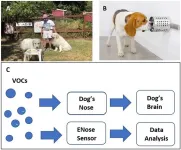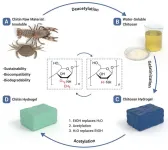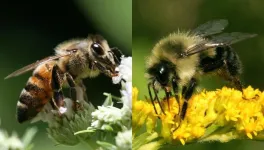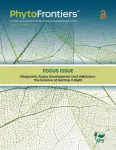(Press-News.org) Scent dogs may represent a cheaper, faster and more effective way to detect COVID-19, and could be a key tool in future pandemics, a new review of recent research suggests. The review, published in De Gruyter’s Journal of Osteopathic Medicine, found that scent dogs are as effective, or even more effective, than conventional COVID-19 tests such as RT-PCR.
Dogs possess up to 300 million olfactory cells, compared to just 5 or 6 million in humans, and use one-third of their brains to process scent information, compared with just 5% for humans. Dogs trained to recognize specific volatile organic compounds created in the body during disease have successfully identified patients with certain cancers, Parkinson’s and diabetes.
Prof. Tommy Dickey of the University of California, Santa Barbara and Heather Junqueira of BioScent Detection Dogs reviewed 29 studies where dogs were used to detect COVID-19. The studies were performed using over 31,000 samples by over 400 scientists from more than 30 countries using 19 different dog breeds. In some studies, the scent dogs sniffed people directly, sometimes in public places as a health screening. In others, the dogs sniffed patient samples such as sweat, saliva or urine samples.
In the majority of studies, the scent dogs demonstrated similar or better sensitivity and specificity than the current gold-standard RT-PCR tests or antigen tests. In one study, four of the dogs could detect the equivalent of less than 2.6 x 10−12 copies of viral RNA per milliliter. This is equivalent to detecting one drop of any odorous substance dissolved in ten and a half Olympic-sized swimming pools and is three orders of magnitude better than modern scientific instruments.
The dogs could detect COVID-19 in symptomatic, pre-symptomatic and asymptomatic patients, along with new COVID variants and even long COVID. A major benefit of using the dogs was their speed – they could provide a result in seconds to minutes, and did not require expensive lab equipment or create mountains of plastic waste, unlike conventional diagnostic approaches.
“Although many people have heard about the exceptional abilities of dogs to help humans, their value to the medical field has been considered fascinating, but not ready for real-world medical use,” said Prof. Dickey. “Having conducted this review, we believe that scent dogs deserve their place as a serious diagnostic methodology that could be particularly useful during pandemics, potentially as part of rapid health screenings in public spaces. We are confident that scent dogs will be useful in detecting a wide variety of diseases in the future."
Prof. Dickey and Heather Junqueira added that they feel that the impressive international COVID scent dog research described in their paper, perhaps for the first time, demonstrates that medical scent dogs are ready for mainstream medical applications.
END
Scent dogs can detect COVID-19 more rapidly and accurately than current tests
Research review finds scent dogs can successfully sniff out COVID-19, including asymptomatic cases, new variants and long COVID
2023-07-17
ELSE PRESS RELEASES FROM THIS DATE:
Robotics: New skin-like sensors fit almost everywhere
2023-07-17
“Detecting and sensing our environment is essential for understanding how to interact with it effectively,” says Sonja Groß. An important factor for interactions with objects is their shape. “This determines how we can perform certain tasks,” says the researcher from the Munich Institute of Robotics and Machine Intelligence (MIRMI) at TUM. In addition, physical properties of objects, such as their hardness and flexibility, influence how we can grasp and manipulate them, for example.
Artificial hand: interaction with the robotic system
The ...
Team fabricates chitin hydrogel via chemical transformation of chitosan
2023-07-17
Chitin hydrogel is recognized as a promising material for a variety of biomedical applications. Its biocompatibility and biodegradability make it useful in tissue repair, artificial organs, and wound healing. Yet scientists continue to face challenges in fabricating chitin hydrogel. A team of researchers has developed a green, efficient and scalable preparation method for chitin hydrogels.
The team’s work provides a rational strategy to fabricate chitin hydrogels and paves the way for its practical applications as a superior biomedical material.
Their ...
Report highlights public health impact of serious harms from diagnostic error in US
2023-07-17
Improving diagnosis in health care is a moral, professional and public health imperative, according to the U.S. National Academy of Medicine. However, little is known about the full scope of harms related to medical misdiagnosis — current estimates range widely. Using novel methods, a team from the Johns Hopkins Armstrong Institute Center for Diagnostic Excellence and partners from the Risk Management Foundation of the Harvard Medical Institutions sought to derive what is believed to be the first rigorous national estimate of permanent disability and death from diagnostic error.
The original research article ...
NUTRITION 2023 press materials available now
2023-07-17
Press materials are now available for NUTRITION 2023, the annual flagship meeting of the American Society for Nutrition (ASN). Top nutrition scientists and practitioners from around the world will gather to share the latest research findings on food and nutrition during NUTRITION 2023, held July 22-25 at the Sheraton Boston.
Register for a press pass to attend NUTRITION 2023 in person or to access embargoed press materials before the meeting. Explore the meeting schedule, poster presentations, and oral presentations to see all the exciting research topics covered at this year’s meeting.
EMBARGOED MATERIALS
Researchers Identify Genes ...
Do common methods for protecting bees from pesticides actually work?
2023-07-17
Annapolis, MD; July 17, 2023—Responsible use of pesticides includes striving to avoid negative effects on the environment, often with an emphasis on protecting bees and other pollinators. A new study, however, finds that many common methods for minimizing pesticides' impact on bees—even some recommendations on product labels—are backed by minimal scientific evidence.
The researchers behind the study say stronger testing is needed to evaluate which bee-protection measures are truly effective ...
FEMSelect announces positive safety and outcome results for EnPlace® in a large study of 123 women during the 2023 International Urogynecology Association 48th Annual Meeting
2023-07-17
FEMSelect Ltd., a women-led company developing innovative technologies to make a lasting impact on women's health, today announced positive results from a large six-month safety and outcome study of EnPlace® in 123 women with pelvic organ prolapse, published in the International Journal of Gynecology & Obstetrics(IJGO).
The article, titled The EnPlace® sacrospinous ligament fixation—A novel minimally invasive transvaginal procedure for apical pelvic organ prolapse repair: Safety and short-term outcome results,1 discusses how investigators found that EnPlace, cleared by the FDA for attaching sutures to ligaments of the ...
Pancreatic cancer vaccine plus immunotherapy and antibody spark immune system response in pancreatic cancers
2023-07-17
Giving patients with operable pancreatic cancers a three-pronged combination immunotherapy treatment consisting of the pancreatic cancer vaccine GVAX, the immune checkpoint therapy nivolumab and urelemab, an anti-CD137 agonist antibody treatment, is safe, it increases the amount of cancer-killing immune system T cells in the tumors and it appears effective when given two weeks prior to cancer-removal surgery, according to new research directed by Johns Hopkins investigators. A description of the work was published online June 20 in the journal Nature Communications.
This study, led by researchers at the Johns Hopkins Kimmel Cancer Center, the Bloomberg~Kimmel ...
Call for proposals: PhRMA Foundation seeks equity-focused research on digital health tools
2023-07-17
The nonprofit PhRMA Foundation launched a new grant program to provide more than $1 million in funding for research on the use of digital health technologies (DHTs) in underrepresented populations in clinical trials to advance regulatory decision-making.
Based on applicants’ letters of intent, the Foundation will award up to eight $25,000 planning grants to support the development of detailed research proposals to compete for two $500,000 grants. Planning grant award recipients will also be offered a $5,000 promotional credit from ...
In determining what’s true, Americans consider the intentions of the information source
2023-07-17
Chestnut Hill, Mass. (7/17/2023) – Putting truth to the test in the “post-truth era”, Boston College psychologists conducted experiments that show when Americans decide whether a claim of fact should qualify as true or false, they consider the intentions of the information source, the team reported recently in Nature’s Scientific Reports.
That confidence is based on what individuals think the source is trying to do – in this case either informing or deceiving their audience.
“Even when people know precisely how accurate or inaccurate a claim of fact is, whether they consider that claim to be true or false hinges on the intentions ...
Broad-scope plant science journal publishes focus issue on critical biosecurity gap
2023-07-17
The vast scale of global trade presents a constant threat of introducing new plant diseases, which is challenging to the United States system of biosecurity. Plant health professionals often must respond quickly to a newly introduced or emerging plant disease outbreak even before a well-validated diagnostic test is available. Additionally, thousands of plant pathogens that already exist have been routinely diagnosed with assays that were not fully or consistently validated, which can lead to inaccurate diagnoses, delays in proper disease management, and significant consequences for growers and the public.
Growing awareness of this gap in coordination and resources for plant disease ...
LAST 30 PRESS RELEASES:
New knowledge on heritability paves the way for better treatment of people with chronic inflammatory bowel disease
Under the Lens: Microbiologists Nicola Holden and Gil Domingue weigh in on the raw milk debate
Science reveals why you can’t resist a snack – even when you’re full
Kidney cancer study finds belzutifan plus pembrolizumab post-surgery helps patients at high risk for relapse stay cancer-free longer
Alkali cation effects in electrochemical carbon dioxide reduction
Test platforms for charging wireless cars now fit on a bench
$3 million NIH grant funds national study of Medicare Advantage’s benefit expansion into social supports
Amplified Sciences achieves CAP accreditation for cutting-edge diagnostic lab
Fred Hutch announces 12 recipients of the annual Harold M. Weintraub Graduate Student Award
Native forest litter helps rebuild soil life in post-mining landscapes
Mountain soils in arid regions may emit more greenhouse gas as climate shifts, new study finds
Pairing biochar with other soil amendments could unlock stronger gains in soil health
Why do we get a skip in our step when we’re happy? Thank dopamine
UC Irvine scientists uncover cellular mechanism behind muscle repair
Platform to map living brain noninvasively takes next big step
Stress-testing the Cascadia Subduction Zone reveals variability that could impact how earthquakes spread
We may be underestimating the true carbon cost of northern wildfires
Blood test predicts which bladder cancer patients may safely skip surgery
Kennesaw State's Vijay Anand honored as National Academy of Inventors Senior Member
Recovery from whaling reveals the role of age in Humpback reproduction
Can the canny tick help prevent disease like MS and cancer?
Newcomer children show lower rates of emergency department use for non‑urgent conditions, study finds
Cognitive and neuropsychiatric function in former American football players
From trash to climate tech: rubber gloves find new life as carbon capturers materials
A step towards needed treatments for hantaviruses in new molecular map
Boys are more motivated, while girls are more compassionate?
Study identifies opposing roles for IL6 and IL6R in long-term mortality
AI accurately spots medical disorder from privacy-conscious hand images
Transient Pauli blocking for broadband ultrafast optical switching
Political polarization can spur CO2 emissions, stymie climate action
[Press-News.org] Scent dogs can detect COVID-19 more rapidly and accurately than current testsResearch review finds scent dogs can successfully sniff out COVID-19, including asymptomatic cases, new variants and long COVID



